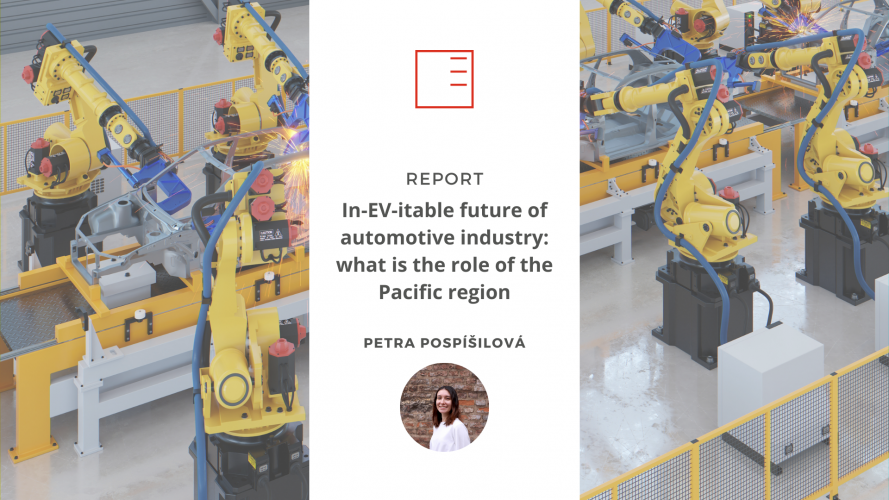REPORT | EU-Pacific Talks: In-EV-itable future of automotive industry: what is the role of the Pacific region
In the last debate of the second series of EU-Pacific Talks, organised by EUROPEUM Institute for European Policy, the guests focused on electric and fuel cell vehicles, which are envisaged as a way to decarbonise road transport. Read what our guests discussed in this report by Petra Pospíšilová.
The urgent need to tackle climate change and reduce greenhouse gas emissions has brought the transport sector under scrutiny as a significant contributor to CO2 emissions. Electric Vehicles (EVs) have gained considerable attention in recent years as a promising solution. The zero-emission nature of EVs and the opportunity to integrate with renewable energy sources positions them as a powerful solution for reducing CO2 emissions in the transport sector. Despite their advantages, the widespread adoption of electric vehicles faces several challenges. To encourage EV adoption, a robust charging infrastructure must be established. Moreover, continued development is essential to address the limitations of battery range and charging time and improve the overall performance of EVs. Furthermore, it is necessary to consider the potential environmental and social impacts associated with mining, as the EV is dependent on critical minerals and rare earth elements.
Read the full report here
#EU-Pacific Talks #ReportOffice and Project Coordinator
Related articles
- REPORT | EU-Pacific Talks: Fostering Work-Life Balance in Diverse Societies
- Report | A Circular Solution for Czechia: Round table discussion on end-of-life management of EV batteries
- Report | EU-Pacific Talks | Unveiling Global South Dynamics: EU and Indo-Pacific Perspectives
- REPORT | EU-Pacific Talks | Global Race in Emerging Technologies: Lessons for EU-Pacific Cooperation
- REPORT | EU-Pacific Talks | Charting the course for Ukraine: Reassessment of the Indo-Pacific
- Report | EU-Pacific Talks: Taiwan and security dimension – lessons learned, Indo-Pacific containment
- Report | "Dictators are forced to win wars or face the end."
- Czech Republic 2030: How to support green transformation and not throw money out the window?
- Report: A Plan without Marshall: Getting Ready for Ukraine’s post-war reconstruction
- EU-Pacific Talks: The weaponisation of information: The future of risk in the digital era?
- Report | Café Evropa: Turkey after the elections, what direction it will take
- Report | European Summer School 2023
- Report | Café Evropa: Artificial Intelligence: opportunity or threat?
- Report | Café Evropa: Crazy and young science in the Czech Republic - something to be proud of
- REPORT | Café Evropa: The future of energy in the Czech Republic - how to further reduce dependence on fossil fuels?
- REPORT | EU-Pacific Talks: Trade relations with the Indo-Pacific
- REPORT | EU-PACIFIC TALKS: Europe and the Indo-Pacific: Migration and demographic changes
- REPORT | EU-Pacific Talks: Be small and beautiful - future of nuclear energy?
- Report | EU-Pacific talks: Free and Open Indo-Pacific: Bold vision for bold players
- REPORT | EU – Pacific Talks: EU – Security Challenges for the Pacific, EU, and Russia
- Café Europe Report 2022
- REPORT: Decarbonisation as a Cure for Energy Poverty: What next for the Social Climate Fund
- REPORT: Fair and Sustainable Future of Transport and Buildings
- Report: EU – Pacific Talks: H2 – Hydrogen Hype
- Report: EU- Pacific talks: U.S.-Japan relations - new leaders, new chance to restore the old relationship
- REPORT: EU – Pacific Talks: Japan – V4 Relations – More Central but Still European
- REPORT: 30 Years of Visegrad: Role of the V4 countries in shaping the future of the EU
- REPORT: New Pact on Migration and Asylum: Breaking the Deadlock
- REPORT: EU-Western Balkans Summit –The Morning After
- EU – Japan Economic Partnership Agreement: Strengthening economic ties as a way out of recession
- REPORT: The V4 towards a new NATO Strategic Concept and the EU Strategic Compass
- Café Evropa: Contest for the White House – what awaits us after the US presidential elections?
- V4 Trust – the Czech Presidency of the Visegrad Group (2015-2016)
- Sharing Experience of Visegrad Countries’ EU Economic Integration and Georgia’s Successful Institutional Reforms for Albania and Kosovo
Staroměstské náměstí 4/1
Prague 1 - Staré Město
110 00
tel.: +420 212 246 552
email: europeum@europeum.org
https://www.europeum.org

